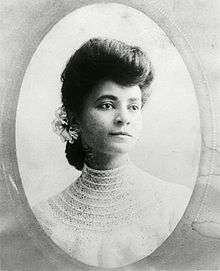Pauline Powell Burns
| Pauline Powell Burns | |
|---|---|
 | |
| Born |
Pauline Powell 1872 |
| Died | 1912 |
| Nationality | American |
| Occupation | artist, musician |
Pauline Powell Burns (1872–1912), also known as Pauline Powell, was the first African-American artist to exhibit in California.[1][2] She was also a pianist who gave recitals around the San Francisco Bay Area.
Family history
Pauline Powell was born in 1872 in Oakland, California, to Josephine Turner and her husband, train porter William W. Powell. Her great-grandfather was blacksmith Joseph Fossett, one of Thomas Jefferson's slaves who was freed by the terms of his will in 1826. Her grandmother Isabella Fossett was also a slave and as a child was sold away from Monticello in 1827 as part of a settlement of estate debts, later escaping to Boston.[1] Powell's parents moved to Oakland, where their daughter Pauline was born in 1872, the year her grandmother Isabella died.[1]
In the mid 1890s she married Edward E. Burns; they had no children.[1][3]
Career
Powell showed early musical and artistic talent and studied both piano and painting.[1] Although African-Americans were by then being admitted to the California School of Design, she appears to have been largely self-taught.[4] She gave public piano recitals locally[1] and at least once sang in a quartet in Los Angeles;[5] she was praised by a Bay Area writer as “the bright musical star of her state.”[1]
Powell is believed to have been the first African-American artist to exhibit anywhere in California.[1][6] She apparently began showing her paintings at the age of 14, but her first known public exhibition was at the Mechanics' Institute Fair in San Francisco in 1890.[2][4] Although her paintings at the fair received "great praise," she was then better recognized as a pianist and is listed in a 1919 history of African-Americans in California solely as a piano teacher.[7]
Powell’s artwork is scarce, partly because of when she lived but also because she died at the age of 40 in 1912.[2] She is known to have painted landscapes and still lifes; surviving works include Champagne and Oysters (ca. 1890), Violets (oil on card, 1890), and a pair of watercolors, one of nasturtiums and the other of tulips, both of which are in the collection of Dunsmuir House in Oakland, California.[2][8][9] Violets is in the collection of the Smithsonian Institution's National Museum of African American History and Culture.[6]
Some documents relating to Powell's life are held in the Archives of California Art.[4]
References
- 1 2 3 4 5 6 7 8 "Pauline Powell Burns" "Getting Word: African-American Families of Monticello," Monticello.org website.
- 1 2 3 4 Sonstegard, Viki. "Pauline Powell: Oakland Painter and Pianist". Women Out West: Art on the Edge of America (website), Oct. 12, 2015.
- ↑ Chandler, Robert J. San Francisco Lithographer: African American Artist Grafton Tyler Brown. Vol. 14. University of Oklahoma Press, 2014, p. 160.
- 1 2 3 Trenton, Patricia, ed. Independent Spirits, Women Painters of the American West, 1890-1945. University of California Press, 1995, p. 12.
- ↑ Smith, Catherine Parsons. Making Music in Los Angeles: Transforming the Popular. University of California Press, 2007, p. 78.
- 1 2 "Highlights from the National Collections". Smithsonian Institution, Oct. 20, 2014, p. 4.
- ↑ Fuller, Diana Burgess, and Daniela Salvioni. Art, Women, California 1950-2000: Parallels and Intersections. University of California Press, 2002, p. 205.
- ↑ Weiss, Rebecca. "A Tale of Two Women: Pioneering Californian Artists Pauline Powell Burns and Beulah Woodard". Swann Auction Galleries website, Jan. 16, 2014.
- ↑ Alexiadis, Jane. "What's It Worth: Painter Has Unique Place in History." San Jose Mercury News, June 3, 2011.